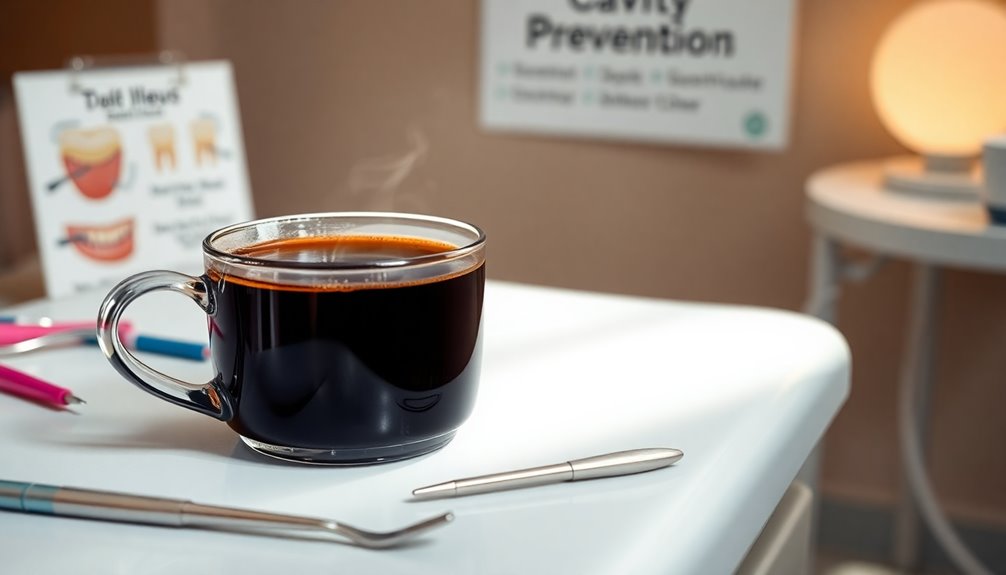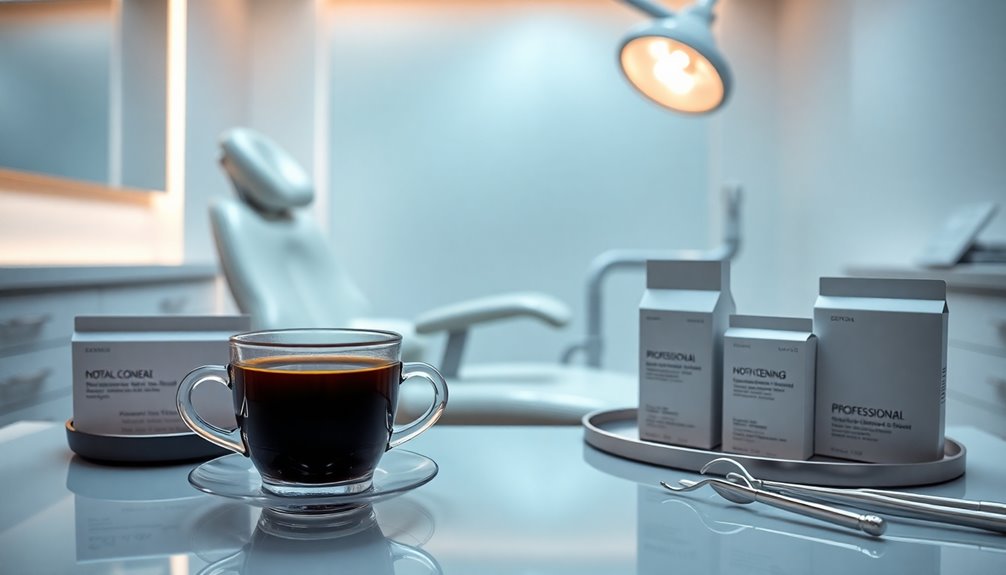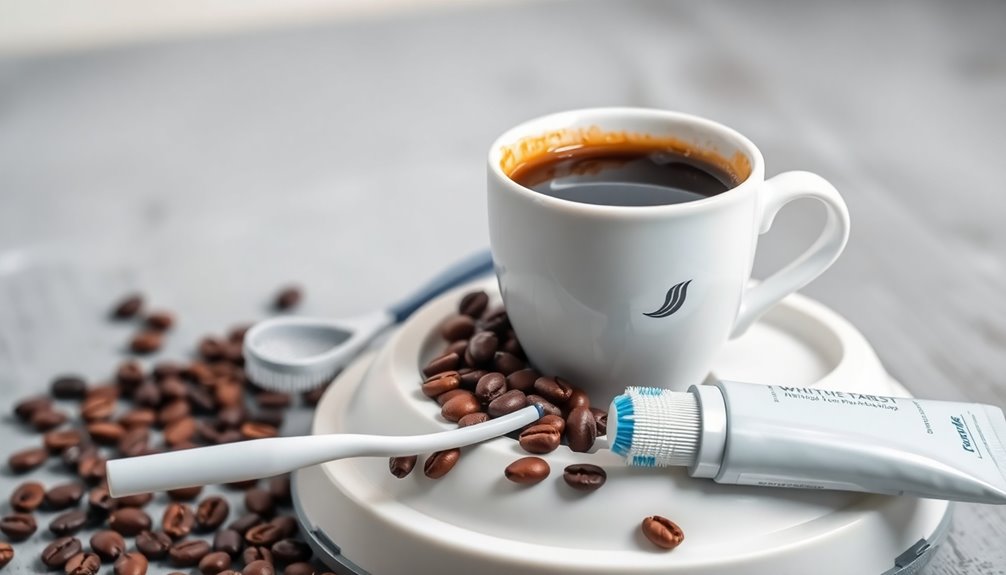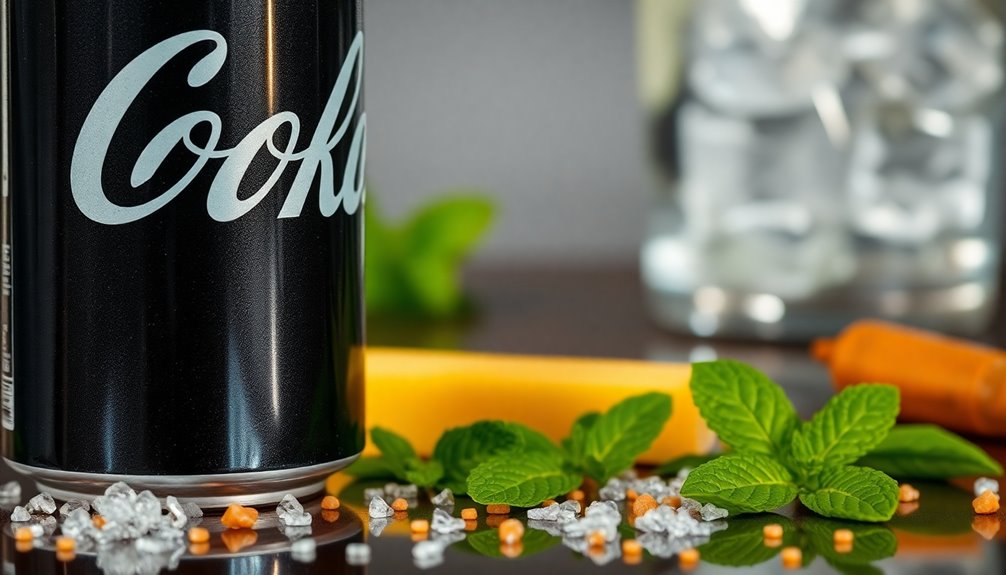Coffee can stain your teeth and pose risks to your oral health. Its chromogens and tannins cling to enamel, leading to discoloration. The acidity in coffee can erode enamel and increase sensitivity, making you more vulnerable to cavities. To combat these effects, limit your intake, rinse with water after drinking, and wait 30 minutes before brushing. Maintaining good oral hygiene practices is essential, like regular brushing and flossing, to prevent gum disease and enamel erosion. With a few adjustments to your routine, you can enjoy your coffee while protecting your smile. Discover more tips to keep your teeth healthy! Additionally, consider using a straw when consuming coffee to minimize contact with your teeth, further reducing coffee’s impact on oral health. Regular dental check-ups are also crucial, as professionals can provide personalized advice and treatments to mitigate staining and protect your enamel. By being mindful of your coffee consumption and incorporating these strategies, you can savor your favorite beverage without compromising your smile.
Key Takeaways
- Coffee contains chromogens and tannins that can stain teeth, with darker roasts causing more discoloration than lighter ones.
- Its acidity can erode enamel and increase tooth sensitivity, making good oral hygiene essential.
- Rinsing with water after coffee consumption can help neutralize acids and reduce staining risks.
- Regular brushing, flossing, and dental check-ups are crucial for preventing cavities and gum disease related to coffee consumption.
- Moderation in coffee intake, limiting to one or two cups daily, can mitigate long-term staining and enamel erosion effects.
Staining Effects of Coffee

While you might love your daily cup of coffee, it's important to be aware that it can stain your teeth over time.
Coffee contains chromogens and tannins that cling to your enamel, leading to unsightly yellow or brown coffee stains. The staining effects vary based on how strong and frequently you drink it, with darker roasts causing more discoloration.
While these stains are primarily surface-level, prolonged exposure can lead to enamel erosion, making your teeth more susceptible to deeper stains and decay.
To combat this, maintaining good oral hygiene is essential. Regular brushing and rinsing with water after your coffee can help minimize these staining effects, reducing plaque buildup and keeping your smile bright.
Impact of Acidity on Enamel

When you enjoy a cup of coffee, its acidity can put your enamel at risk for erosion.
This erosion not only increases sensitivity but can also lead to cavities due to the weakened protective barrier.
To protect your teeth, it's important to explore techniques for neutralizing acidity after your coffee fix.
Enamel Erosion Risks
Coffee's acidity poses a significant risk to your tooth enamel, as its pH typically falls between 4.5 and 6.5. This acidity can weaken enamel, making it more susceptible to decay and gum disease. Prolonged coffee consumption without proper oral hygiene not only causes enamel erosion but can also lead to increased tooth sensitivity and a dull smile.
| Effect | Cause | Recommendation |
|---|---|---|
| Enamel Erosion | Acidic beverages | Rinse your mouth |
| Increased Sensitivity | Exposed dentin | Maintain oral hygiene |
| Dull Smile | Staining and erosion | Limit coffee intake |
To protect your enamel, remember to rinse your mouth after drinking coffee and maintain good oral hygiene practices.
Acid Neutralization Techniques
To protect your enamel from the risks associated with coffee's acidity, it's important to employ effective acid neutralization techniques.
Coffee, with a pH range of 4.5 to 6.5, can erode your enamel over time, increasing the chances of tooth sensitivity and cavities. Rinsing your mouth with water after enjoying coffee can help neutralize its acidity and reduce enamel damage.
Make sure to wait at least 30 minutes before brushing your teeth, allowing saliva to naturally neutralize the acids first. Additionally, incorporating fluoride toothpaste into your oral hygiene routine strengthens your enamel, providing extra protection against the harmful effects of coffee.
Dry Mouth and Oral Health

How does dry mouth affect your oral health? When you experience dry mouth, your saliva levels drop, making it harder for your mouth to neutralize the acidity from foods and drinks, including coffee.
This creates an environment where bacteria that cause cavities can thrive, leading to tooth decay and gum disease. The lack of moisture also contributes to bad breath, as the proliferation of bacteria intensifies unpleasant odors.
To combat dry mouth, try chewing sugar-free gum to stimulate saliva production and keep your mouth hydrated. Additionally, rinsing your mouth with water after drinking coffee can help mitigate the drying effects and promote better oral health.
Staying hydrated is key to maintaining a healthy mouth.
Coffee and Gum Disease

While you might enjoy your daily cup of coffee, it's important to recognize its potential impact on your gum health. The acidic nature of coffee affects your enamel, increasing your risk of developing gum disease.
Erosion of enamel makes your gums more susceptible to decay and infection, creating a breeding ground for bacteria that can lead to gingivitis, characterized by swollen and bleeding gums. Regular coffee consumption often links to a heightened risk of periodontal disease.
Although coffee has some antibacterial properties, they typically don't outweigh its negative effects. To protect your teeth and gums, maintaining good oral hygiene and scheduling regular dental check-ups is essential for monitoring the risks associated with your coffee habit.
Tips for Coffee Lovers

If you love coffee but want to protect your oral health, there are several strategies you can adopt.
First, consider sipping coffee through a straw to minimize contact with your teeth, which can help reduce staining.
After enjoying your cup, rinse your mouth with water to wash away pigments and neutralize acidity.
Opt for low-acid coffee varieties like Arabica beans to take care of your tooth enamel.
Limiting your intake to one or two cups a day can also considerably lower the risk of discoloration.
Wait at least 30 minutes after drinking before brushing your teeth, allowing saliva to naturally neutralize acids.
Finally, regular dental cleanings and fluoride toothpaste will help maintain your oral health and keep stains at bay. Additionally, consider the importance of budgeting for dental care to ensure you can afford regular check-ups and treatments.
Professional Whitening Options

If you're looking to brighten your smile after enjoying coffee, professional whitening options can be a game changer.
In-office treatments deliver quick results, while custom at-home trays offer flexibility for gradual whitening.
It's important to evaluate both methods to find what works best for you.
In-office Whitening Treatments
In-office whitening treatments offer a quick and effective solution for those looking to brighten their smile.
These professional whitening treatments typically use higher concentrations of hydrogen peroxide, giving you immediate results compared to at-home options. In just one session, lasting about 60-90 minutes, you can lighten your teeth by several shades.
Dentists often enhance the effectiveness of the whitening agents with specialized light or heat sources during the procedure.
To maintain your bright smile afterward, your dental professional may provide custom whitening trays for at-home use.
It's also a good idea to schedule regular dental cleanings before your whitening appointment to remove surface stains and plaque, maximizing the results of your in-office treatment.
At-home Whitening Trays
At-home whitening trays offer a convenient and effective way to achieve a brighter smile from the comfort of your home. These custom-fitted devices deliver whitening gel evenly, tackling staining caused by coffee more efficiently than strips. With consistent use, usually 30 minutes to an hour daily for about two weeks, you can lighten your teeth by several shades.
| Feature | At-Home Whitening Trays | Professional Whitening |
|---|---|---|
| Custom Fit | Yes | Yes |
| Active Ingredient | Carbamide Peroxide/Hydrogen Peroxide | Varies |
| Maintenance | Regular use recommended | Follow-up treatments needed |
Consult your dentist before starting to verify the trays fit well and discuss any side effects. This step is vital for your dental health.
Over-the-counter Whitening Strips
While you might be tempted by the convenience of over-the-counter whitening strips, it's crucial to recognize their effectiveness in combating coffee stains. These strips typically contain hydrogen peroxide or carbamide peroxide, which can lighten stains on your teeth when used consistently.
Clinical studies show they can reduce surface stains by several shades, enhancing your overall tooth brightness. However, the results may not be as fast or noticeable as professional whitening options, which provide tailored approaches and longer-lasting effects.
If you have sensitive teeth or gum issues, it's vital to consult a dentist before starting any whitening regimen. They can help assess your suitability for whitening strips and guide you toward the best options for your needs. Additionally, maintaining good oral health habits, such as regular brushing and flossing, can further prevent the buildup of stains from coffee and other beverages.
Research on Coffee and Teeth

Research on coffee's impact on teeth reveals a complex relationship between enjoyment and oral health. While sipping your favorite brew might bring pleasure, it also carries risks.
Coffee contains tannins and chromogens that can stain your tooth enamel, leading to unwanted yellow or brown discoloration. Its acidic nature, with a pH of 4.5 to 6.5, can erode the enamel, increasing your risk of cavities and sensitivity.
However, some studies suggest that coffee may help neutralize harmful oral bacteria, potentially lowering tooth decay rates.
To protect your smile, rinse your mouth with water after enjoying coffee and maintain good oral hygiene practices. Balancing your love for coffee while taking care of your teeth is essential for ideal oral health.
Frequently Asked Questions
How Do You Prevent Staining After Drinking Coffee?
To prevent staining after drinking coffee, rinse your mouth with water right away to neutralize acidity and wash away pigments.
Using a straw can help minimize contact between coffee and your teeth.
Try to limit sugars and creamers, as they can lead to cavities and increase staining.
Also, stick to low-acid coffee varieties, like Arabica beans, and maintain a solid oral hygiene routine to keep your teeth looking their best.
How Do You Prevent Coffee Cavities?
You might enjoy that rich, dark brew, but have you thought about what it could be doing to your teeth? To prevent cavities, limit your coffee to one or two cups daily.
Rinse with water afterward to neutralize acidity. Using a straw can help, too, as it minimizes contact with your enamel.
Opt for low-acid varieties and stick to a solid oral hygiene routine, including regular brushing and dental check-ups, to keep your smile healthy.
Does Mouthwash After Coffee Prevent Staining?
Using mouthwash after coffee can help prevent staining. It neutralizes acidity and washes away the staining agents, reducing discoloration on your teeth.
If you choose a fluoride mouthwash, it'll strengthen your enamel, which is essential after consuming acidic drinks. Rinsing also combats dry mouth caused by caffeine, promoting saliva production for natural cleansing.
Just remember, not all mouthwashes are created equal, so pick one specifically designed to tackle stains for the best results.
How Do People Who Drink Coffee Keep Their Teeth White?
Did you know that almost 50% of coffee drinkers experience tooth staining?
To keep your teeth white, rinse your mouth with water right after sipping to neutralize acidity. Using a straw can minimize contact with your teeth, reducing discoloration.
Switching to fluoride toothpaste strengthens enamel, while regular dental cleanings help remove stains.
Finally, limiting sugar and cream not only cuts cavity risk but also helps maintain your bright smile.
Conclusion
To sum up, while coffee can stain your teeth and impact your oral health, there are ways to enjoy your favorite brew without sacrificing your smile. Did you know that 68% of coffee drinkers experience some level of tooth staining? By maintaining good oral hygiene and considering professional whitening options, you can keep your teeth bright. So, savor that cup of coffee, but remember to take care of your dental health, too!










